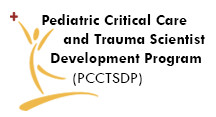Overview
 PCCTSDP is a national faculty training program that develops pediatric critical care and pediatric trauma physician-scientists. The program strives to increase the number of highly trained, successfully funded, and sustainable pediatric critical care and pediatric trauma physician-scientists who engage in research to enhance the scientific understanding, clinical management, and long-term outcome of critical illness and trauma in children.
PCCTSDP is a national faculty training program that develops pediatric critical care and pediatric trauma physician-scientists. The program strives to increase the number of highly trained, successfully funded, and sustainable pediatric critical care and pediatric trauma physician-scientists who engage in research to enhance the scientific understanding, clinical management, and long-term outcome of critical illness and trauma in children.
PCCTSDP is funded through a Physician Scientist Award (K12) program by NICHD’s Pediatric Trauma and Critical Illness Branch to select the most outstanding junior faculty candidates for sustained training as PCCTSDP scholars in research settings throughout the United States. The most recent PCCTSDP funding announcement is RFA-HD-24-001 (K12 Clinical trial Optional).
PCCTSDP is currently administered through the University of Utah School of Medicine, with program governance by the National Advisory Committee (NAC), composed of scientists and leaders in pediatric critical care and trauma surgery.
Program Details
PCCTSDP requires 5 years of commitment and participation from scholars and their institutions to complete its two phases and related activities:
- Phase I. Scholars are funded for up to 2 years while pursuing intense research training in a mentored laboratory or clinical research setting.
- Involves a minimum of 75% protected time for research training.
- Includes salary support, limited laboratory support for supplies, travel to the annual retreat and appropriate scientific meetings, and limited tuition support for specific training opportunities.
- Phase II. Scholars must be supported by their institution, preferably with NIH extramural funding, such as K08 or K23 awards. Institutions must protect Phase II scholars for a minimum of 50% of time, but preferably for 75% of their time.
In addition, PCCTSDP includes related activities such as:
- Assistance with original application, by the program director
- Interviews and interactions with NAC members
- Assistance with preparation of extramural grant proposals
- Site visits of Phase I scholar training institutions to verify training environment
- Participation at the annual PCCTSDP retreat, where scholars can network, gain academic survival skills, practice interviewing, present scientific findings, learn about becoming a mentor, etc.
PCCTSDP is committed to the principles of diversity in academic pediatric critical care and trauma medicine. Funding is available to assist potential candidates who are from a diverse background and have an early interest in pediatric critical care in attending the program’s annual retreat. These participants will join in a focused development session where they can view the application process and network with applicants, mentors, and NAC members.
More Information
- PCCTSDP Website
(maintained by the University of Utah School of Medicine)
- RFA-HD-24-001: Pediatric Critical Care and Trauma Scientist Development Program (K12 Clinical Trial Optional)
- NICHD Contact: Tessie October
 BACK TO TOP
BACK TO TOP